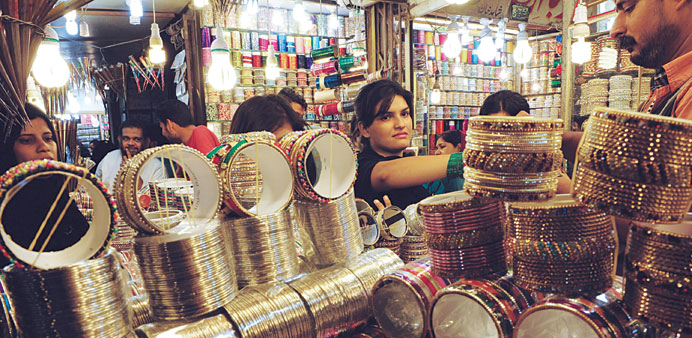Internews/Karachi
As the Eid al-Fitr is approaching in Pakistan, shopping is gaining momentum as improved law and order situation has facilitated buyers to visit shopping centres.
In the absence of any credible official sales data of Eid-related items, market traders project overall sale of Rs80bn in Karachi alone as against Rs60-70bn last year.
Traders said that like previous two to three years, a large number of people made pre-Ramadan shopping as they feared that the situation may aggravate in major cities as an after effect of the military operation in tribal areas.
All-Karachi Tajir Ittehad chairman Atiq Mir was of the view that Eid shopping may cross over Rs80bn this year despite extreme poverty. A sizeable segment is so poor that they can’t even afford to buy a suit costing Rs800-1,200.
“I believe that 30% people in Karachi, like labour class and those living below the poverty line cannot afford to indulge in Eid shopping, unless someone else enables them to purchase new clothes,” he said.
Traders have not scaled down prices despite rupee’s gain against the US dollar which has made import of foreign items cheaper in the last few months.
High spending for Eid al-Fitr appears surprising when cost of living has risen due to rise in food inflation, high fuel prices and high cost of bills. This has forced many people to buy sub-standard clothes and other used items.
According to Pakistan Bureau of Statistics (PBS), import bill of worn clothes, including shoes, shirts, jackets, woolen garments, trousers, socks, sweaters jumped to $182mn (457,600 tonnes) in 2013-2014 as compared to $146m (375,485 tonnes) in 2012-2013, showing a jump of 22% in quantity and 25% in value.
Traders said that price is not an issue on Eid al-Fitr since markets offer costly to cheaper merchandise for different categories of buyers.
Unable to cover the cost, many parents approach friends and relatives for small loans to meet demands of their children. At the other end of the social scale, there are people who spend freely.
Small Traders of Artificial Jewellery and General Merchant Association President Saleem Saba said sale of artificial jewellery has risen by 25% as compared to last year.
He said in fancy jewellery, the local industry holds 75% market share as compared to 25pc of imported jewellery, mostly Indian.
In contrast, Chinese items, like hair-clips, hair-bands and other wearing accessories hold 75% market share since these are not produced in the country.
“The import of these Chinese items for this Eid season is estimated at Rs10bn,” he added. Some plastic cosmetics have also arrived from India.
A retailer of crockery items in Hyderi said that sales of crockery items (both imported and local) like glasses, plates, tea cups, etc soars three times higher during Ramadan than normal days.
Barring locally made mehndi, Chinese cosmetic items dominate the markets with 90pc share as females do not trust in locally-made products.
“Our sales double during Ramadan than normal days,” a cosmetic seller said.
Allawala Market president Mohamed Asif said that sale of readymade shalwar-kameez has jumped by 40% than last year, especially in gents suits, while demand for unstitched suits has plunged.
“The overall tone of the market in terms of sale looks better than last year despite high prices of goods,” he said.

A Pakistani woman buys bangles ahead of the Muslim festivities of Eid al-Fitr, in Karachi yesterday.
